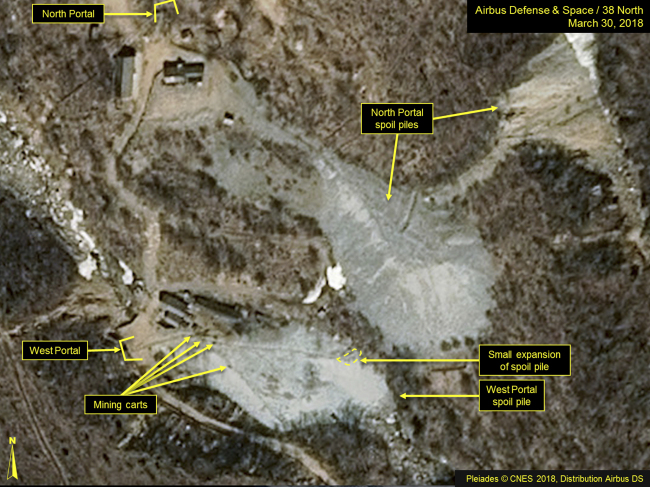While North Korea appears to be dismantling its nuclear test site ahead of its first-ever summit with the US next month, doubts persist over whether Pyongyang will uphold its pledge for complete denuclearization, due to the lack of a thorough verification process.
Citing satellite imagery captured May 7, US-based North Korea website 38 North said Monday that key operational support buildings have been removed at the Punggye-ri nuclear test site, which North Korea said would be shut down between May 23 and 25 in the presence of journalists.
Some of the rails for mining carts have also apparently been removed, the website said, adding that some carts seem to have been tipped over or disassembled. The carts had been used for linking underground tunnels to respective spoil piles.
While other more substantial facilities remain intact, the satellite imagery “provided the first definitive evidence that dismantlement of the test site was already well underway,” 38 North said in its analysis.
South Korea’s Joint Chiefs of Staff said Tuesday that North Korea will proceed with its announced plan for the shutdown, which will involve collapsing all of its tunnels with explosions, blocking its entrances and removing all observation facilities, research buildings and security posts.
 |
Satellite imagery of Punggyeri nuclear test site. Yonhap |
The shutdown process will unfold under the presences of journalists, including those from the US and South Korea. Seoul’s Ministry of Unification said Tuesday that Pyongyang had invited eight South Korean reporters to the event.
Despite the pledge to shut down the Punggye-ri facility, concern is growing that Pyongyang might fall short of meeting expectations of complete, verifiable denuclearization without thorough inspections of the nuclear test site by nuclear experts
In announcing detailed plans to invite journalists to the test site, where all of North Korea’s six known nuclear tests were conducted, North Korea’s state-run media did not mention bringing nuclear experts for what would be the first move of the arduous denuclearization process.
“It’s nothing but a show to destroy evidence of previous nuclear tests,” said Chun Young-woo, former national security adviser for conservative President Lee Myung-bak. “They only want to invite those who can play along with their own event.”
Chun, who had also served as a top nuclear envoy for liberal President Roh Moo-hyun, said the Punggye-ri facility is the “perfect place” to gauge North Korea’s current nuclear capability -- a process crucial for future denuclearization talks.
Through the nuclear tests since 2006, the test site is considered to have huge amounts of nuclear material -- such as plutonium and enriched uranium -- which might well remain in the underground tunnel following the tests.
Suh Kyun-ryul, a professor of nuclear engineering at Seoul National University, agreed that the test site could contain residual nuclear material, saying the inspection process should come first, before shutting down the test site.
“It’s like closing the abdomen when you find a cancer tumor during surgery,” said Seo. “I don’t understand why North Korea is so rushed for it.”
While South Korea’s government appeared to downplay the absence of nuclear experts and international watchdogs, the US and Japan stressed the need to invite them for a more verifiable process.
According to a report from Voice of America on Monday, a White House official said while Washington welcomed Pyongyang’s decision to close down the nuclear site, the process should undergo inspections by international experts.
In an interview with a Japanese broadcaster, Foreign Minister Kono Taro called for thorough inspections by international experts and watchdogs, and criticized the plan to open up the nuclear site only to reporters.
“I think it is meaningless to open up the facility only to the reporters,” said Kono, according to the Japanese daily Asahi Shimbun. “We need access by the people who can confirm whether the shutdown would lead to abandonment of nuclear weapons.”
The South Korean government, which had expected North Korea to invite nuclear experts and international watchdogs for the shutdown process, said it remains to be seen whether Pyongyang maintains its stance.
If North Korea eventually decides to exclude expert groups, the decision would show Pyongyang’s willingness to complete the process of dismantling the nuclear site in a “prompt” manner, Seoul’s presidential office said, on the apparent logic that expert verification could delay the process.
“We believe North Korea is postulating various circumstances. ... We don’t know what kinds of decision they would make,” a senior Cheong Wa Dae official told reporters Monday under the customary condition of anonymity.
“My view is that North Korea wants to finish the job (of dismantling the nuclear test site) in a prompt, transparent and simple manner. ... Inviting the experts might complicate the process.”
(
jasonyeo@heraldcorp.com)






![[Herald Interview] 'Trump will use tariffs as first line of defense for American manufacturing'](http://res.heraldm.com/phpwas/restmb_idxmake.php?idx=644&simg=/content/image/2024/11/26/20241126050017_0.jpg)
![[Exclusive] Hyundai Mobis eyes closer ties with BYD](http://res.heraldm.com/phpwas/restmb_idxmake.php?idx=644&simg=/content/image/2024/11/25/20241125050044_0.jpg)
